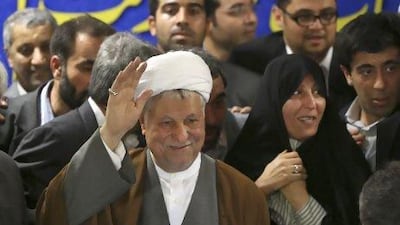Mahmoud Ahmadinejad vowed yesterday to challenge a ban on his chosen successor from running in next month's Iranian presidential elections.
Esfandiar Rahim Mashaei is "a victim of injustice" and his disqualification is an act of "oppression", the outgoing president said.
Mr Mashaei, Mr Ahmadinejad's former chief of staff, was disqualified by Iran's electoral watchdog on Tuesday night. Even more significantly, it barred the moderate former president Akbar Hashemi Rafsanjani, a standard bearer for the opposition, from contesting the June 14 vote.
This leaves a narrow field dominated by hardline acolytes of the supreme leader, Ayatollah Ali Khamenei. The bans will deepen voter apathy, undermine the legitimacy of the election and make Iran's power base narrower than ever, leaving reformists and centrists feeling marginalised, alienated and angry, analysts said.
To avert possible protests, riot police on motorcycles patrolled Tehran when the final list of eight candidates, cut from nearly 700 who registered, was announced.
Internet speeds were also slowed, apparently to prevent online organisation of demonstrations.
Mr Mashaie's disqualification was expected. A protégé of the unruly Mr Ahmadinejad, he is despised by Iran's old guard, who say he heads a "deviant" current" bent on undermining clerical authority.
Mr Khamenei is also determined that Mr Ahmadinejad - whom he once championed - retain no behind-the-scenes power when his eight turbulent years in office end.
Mr Ahmadinejad said he would raise the disqualification with Mr Khamenei and expressed hope the "problem will be solved". Mr Mashaei's campaign office called on his followers to show restraint and calm.
The president has warned that he has incriminating intelligence files on top regime officials and could publicise them if his ambitions are thwarted. The regime appears prepared to call his bluff and to clamp down hard if he stirs trouble, calculating that he no longer enjoys popular support or has any clout with the Revolutionary Guards, who have vowed to crush any "sedition".
More surprising was Mr Rafsanjani's disqualification by the Guardian Council, an unelected panel of 12 religious figures and jurists controlled by the supreme leader. The two-time former president has stellar revolutionary credentials as a founding father of the Islamic Republic. But his camp said yesterday he would not challenge his disqualification.
Hardliners maintained that, at 78, Mr Rafsanjani was too old to be president, although the head of the Guardian Council that disqualified him, Ayatollah Ahmad Jannati, is 87.
"It seems Khamenei decided to sacrifice the legitimacy of the elections rather than face a possible Rafsanjani victory," said Scott Lucas, an Iran expert at Birmingham University in England. "Elements in the regime decided to slap down Rafsanjani now rather than during the campaign."
Alireza Nader, an analyst at the Rand Corporation, went further. "Khamenei may still overturn the decision, but Rafsanjani's disqualification shows that Khamenei is determined to wield all power," he said. "This appears to be a presidential selection rather than an election."
Others saw a chink of light. Among the eight allowed to run is a Rafsanjani ally, Hassan Rouhani, one of Iran's former chief nuclear negotiators, and Mohammad Reza Aref, a reformist former vice president.
The presidential election could yet be energised if Mr Rafsanjani, a wily survivor, endorses either of these low-key candidates.
There is a precedent. Four years ago, a seemingly lacklustre reformist candidate, Mir Hossein Mousavi, who had steered clear of Iran's political front lines for two decades, emerged as a major threat to the regime when myriad opposition forces vested their hopes in him.
He has been under house arrest for more than two years.
* Additional reporting by Reuters
twitter: For breaking news from the Gulf, the Middle East and around the globe follow The National World. Follow us

